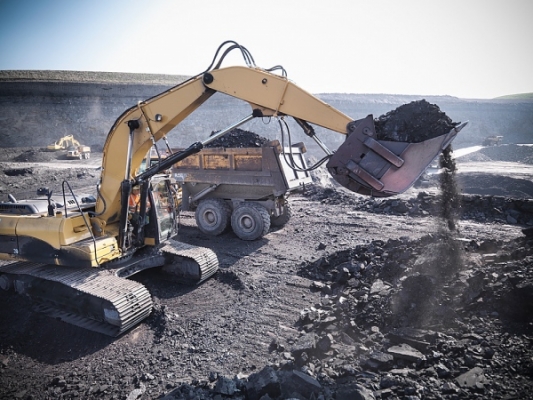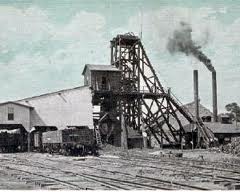North Korea: North Korea’s mining prospects
2011/08/31

North Korea’s mining prospects
 The mining industry is one of the most important components of North Korea's economy and minerals are its most important export commodity.
The mining industry is one of the most important components of North Korea's economy and minerals are its most important export commodity.
North Korea hosts sizeable deposits of more than 200 different minerals. Of those mineral resources identified, deposits of coal, iron ore, magnesite, gold ore, zinc ore, copper ore, limestone, molybdenite, and graphite are the largest and all have the potential for the development of large-scale mines. North Korea's magnesite reserves are the second largest in the world, after China, and its tungsten deposits are likely the sixth-largest in the world.
Yet North Korean mining production has decreased significantly since the early 1990s. It is likely that the average operation rate of existing mine facilities is below 30 per cent of capacity. North Korea has a shortage of mining equipment such as load haul dumps, jumbo drills, and conveyor systems. It is unable to purchase new equipment due to its dire economic situation. The energy shortage and the age and generally poor condition of the power grid are hampering North Korean mineral production. Almost all North Korean mines suffer from a lack of electric power. According to the South Korean Mine Survey team's data, it is assumed that North Korean mines have very weak electric power systems and low-quality electricity (voltage in North Korea is approximately 130–205V, normal voltage is 220V) and frequency variations are 39–54Hz (normal frequency is 60Hz). Under these circumstances, North Korean mines cannot operate the necessary mining equipment. Alternatives need to be sought in order to solve the electricity shortage. To improve mine productivity the construction of large-scale hydroelectric plants as well as the remodeling of the overall power system in cooperation with Russia and South Korea, would help address this problem.
North Korea is attempting to increase its mine production, explore new mineral resources, and modernise its mining technology.
The North Korea government has given special priority to the exploration and development of new mineral resources, especially ferrous and non-ferrous minerals. Recently, North Korea's mineral resources. North Korea desires international assistance through joint projects to explore its mineral resources, and mainly its rare metal and rare earth minerals.
North Korea has also expressed an interest in mining technology innovation, including the development of mineral processing technology for oxide minerals, purification technology for raw metals and separation and purification technology for rare metal minerals. North Korea is interested in joint projects with other countries to develop these mining technologies.
The track record for joint foreign projects, however, is poor. Foreign companies from China, Japan, the United States, and the United Kingdom (not including those from South Korea) have participated in about 25 mining projects in North Korea. Among these projects, about five were known to have been actualised, and in operation. Chinese companies have been participating in North Korean mine projects since 2003. China remains North Korea's leading investment partner in mining projects and, with the exception of Chinese companies, foreign companies have not succeeded in North Korea.
It is difficult for foreign investors to participate in the management of joint companies with North Korea. Foreign investors want to establish their own companies and operate the mines. The rights of investors to ownership, exports, and other key business arrangements related to the North Korea mining industry are unclear. North Korea is not forthcoming about its mining projects and will not provide information without prior investment agreements with foreign companies. Additionally, the antiquated infrastructure (including power, rail, and ports), and resulting low productivity, make mining operations difficult for foreign investors. Without favourable conditions for investors, foreign investment in mining will remain low.
For inter-Korean projects the track record is no better. The inter-Korean mining projects in North Korea have stopped production since 2008.
In North Korea, South Korean companies are considered neither a foreign company nor a domestic company. With no status, they cannot enter into and stay in North Korea without prior approval. North Korea's investment laws are abstract and vague, and generally do not allow South Korea access to North Korean mines. North Korea also does not provide mineral information without a prior investment agreement. It is very difficult to survey the mine sites, especially the power facilities.
Inter-Korean mining cooperation is, however, very important for both sides. North Korea can increase mine production and stimulate its economy while South Korea has the potential to secure nearby mineral commodities if this were to happen. South Korea depends on imports of mineral commodities due to its own poor supply of mineral resources. South Korea's import costs for mineral commodities have significantly increased as the mineral costs have risen. South Korean investments in mining are likely resume in the future because mineral development cooperation offers big mutual benefits to the two Koreas.
If political relations stabilise between the two Koreas in the near future, joint mining projects will be a high priority. South Korea is ready to resume mining negotiations when security preconditions have been met. The first mining project to resume between the Koreas is likely to be in the Dancheon district. In 2007, a joint mine survey was carried out by the two Koreas in this area. Mining cooperation could be easily resumed at the Daeheung magnesite mine and the Geomdeok zinc mine, both of which are viable projects. If North Korea addresses the investment risk and barriers to entry, South Korean companies would quickly consider investing in these mines.
South Korea has the capacity in future to provide mining facilities and technology, while North Korea can provide the mines and workers. To facilitate South Korean investment, North Korea is likely to suggest developing new mines, reopening non-operating mines and improving existing mines and metallurgy plants. For this to be realised, North Korea will need to create favourable conditions for foreign investment more generally and uphold its contracts with South Korean companies.
Choi Kyung-soo is President of thesources Institute in Seoul.
- Related Articles
-
North Korea detains Russian yacht in neutral waters
2016/05/15 A Russian official says North Korea has seized a Russian yacht with five crew members in the Sea of Japan without offering any "explanation." "The North Korean side has communicated that the yacht has been taken to the port of Kimchaek," said Igor Agafonov, a Russian foreign ministry official on Saturday. He added that the crew members aboard Elfin are alive and unharmed and that Russia is attempting to gain access to them. -
China halts cash flow to North Korea
2016/03/06 The four largest Chinese banks have stopped yuan and dollar cash transfers to North Korea, reports the Japanese newspaper Tokyo Shimbun. -
Asian Markets Retreat After Oil Prices Fall Again
2016/01/26 Asian stock markets retreated on Tuesday, snapping a two-day winning streak, following the weak cues overnight from Wall Street and the pullback in oil prices. Investors as well treaded cautiously ahead of monetary policy statements by the U.S. Federal Reserve and the Bank of Japan later in the week. The Japanese market is notably lower, with the negative lead from Wall Street and the fall in oil prices denting risk appetite. Additionally, a stronger yen hurt exporters' stocks. In late-morning trades, the benchmark Nikkei 225 Index is declining 319.08 points or 1.86 % to 16,791.83, off a low of 16,683.64 in early trades. -
Global growth will be disappointing in 2016: IMF's Lagarde
2016/01/02 World economic increase will be disappointing next year and the outlook for the medium-term has as well deteriorated, the chief of the International Monetary Fund said in a guest article for German newspaper Handelsblatt published on Wednesday. IMF Managing Director Christine Lagarde said the prospect of rising interest rates in the United States and an economic slowdown in China were contributing to uncertainty and a higher risk of economic vulnerability worldwide. Added to that, increase in world trade has slowed considerably and a decline in raw material prices is posing problems for economies based on these, while the financial sector in a lot of nations still has weaknesses and financial risks are rising in emerging markets, she said. -
Revised IMF forecasts signal gloom on global economic outlook
2015/01/20 Low oil prices will not provide a sufficient updraught to dispel the clouds hanging over the world economy, the International Monetary Fund said on Tuesday. In a sign of its increasing gloom about the medium term economic outlook, the IMF cut its world economic increase forecasts by 0.3 % points for both 2015 and 2016, despite believing cheaper oil represents a “shot in the arm”.
-
- North Korea News
-
- NORTH KOREA: North Korea detains Russian yacht in neutral waters
- CHINA: China halts cash flow to North Korea
- CHINA: Asian Markets Retreat After Oil Prices Fall Again
- AFGHANISTAN: Global growth will be disappointing in 2016: IMF's Lagarde
- AFGHANISTAN: Revised IMF forecasts signal gloom on global economic outlook
- AFGHANISTAN: Oxfam Study Finds Richest 1% Is Likely to Control Half of Global Wealth by 2016
- Trending Articles
-
- AZERBAIJAN: Azerbaijan to become export gateway for Indonesian products to European market
- AFRICA: More than 41 million in southern Africa face food insecurity
- CHINA: Chinese Developers Delay Bond Maturity, Deficit to Peak in 2020
- SOUTH AFRICA: South Africa to extend ICT reach
- CHINA: Chinese Group negotiates to buy bank in Brazil
- ITALY: Italy Must Confront Its Past to Stave Off the Far-Right








